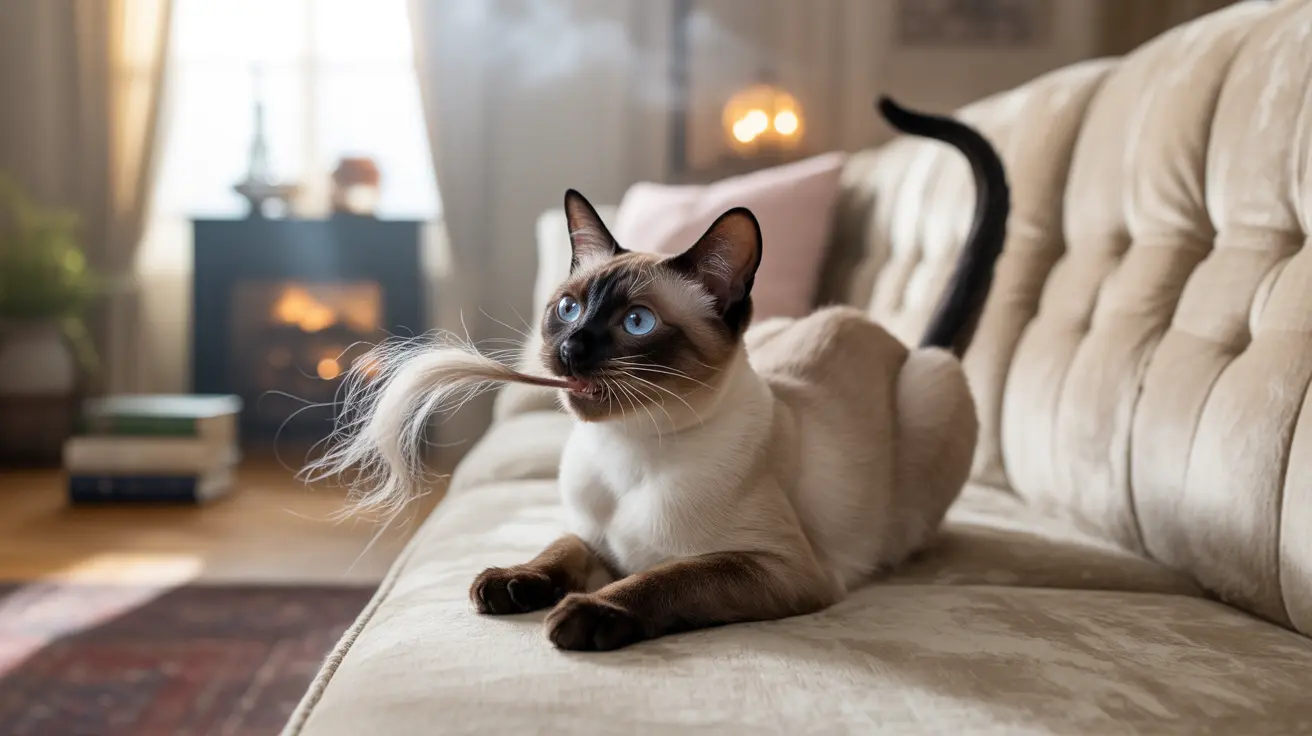The Natural Instinct Behind Hair Eating
Cats are naturally drawn to hair for several instinctive reasons. The primary motivation often stems from their social grooming behavior, known as allogrooming. In feline social groups, cats groom each other as a sign of affection and bonding. When your cat nibbles on your hair, they're often extending this natural behavior to you, their trusted family member.
Additionally, the texture and movement of human hair can trigger a cat's hunting instincts. Long, flowing hair might resemble prey, making it an irresistible target for playful cats, especially during active periods.
Medical and Behavioral Causes
Stress and Anxiety
Sometimes, hair eating can indicate underlying stress or anxiety. Cats may turn to this behavior as a coping mechanism when facing changes in their environment, new family members, or other stressors. This self-soothing behavior might become more pronounced during times of upheaval or uncertainty.
Compulsive Disorders and Pica
In some cases, hair eating may be related to pica, a condition where cats compulsively eat non-food items. This behavior is more common in certain breeds, particularly Siamese, Burmese, and Tonkinese cats. If your cat frequently consumes non-food items beyond just hair, it's important to consult with your veterinarian.
Health Risks and Concerns
While occasional hair nibbling might seem harmless, regular consumption of human hair can lead to several health issues:
- Digestive problems and discomfort
- Formation of hairballs
- Potential intestinal blockages
- Gastrointestinal irritation
Prevention and Solutions
Environmental Enrichment
Creating an engaging environment for your cat can help reduce unwanted hair-eating behavior. Consider:
- Providing interactive toys
- Setting up climbing spaces
- Establishing regular play sessions
- Creating safe hiding spots
Behavioral Modification
To discourage hair eating, try these approaches:
- Redirect attention with appropriate toys
- Maintain consistent feeding schedules
- Use positive reinforcement
- Establish regular grooming sessions
Frequently Asked Questions
Why does my cat chew or eat my hair as a sign of affection?
Cats chew hair as part of their natural social grooming behavior. In feline communities, mutual grooming strengthens bonds, and your cat is extending this affectionate behavior to you as a family member.
Can my cat eating my hair be a sign of stress or anxiety?
Yes, hair eating can indicate stress or anxiety in cats. This behavior might increase during times of change or when your cat feels unsettled. Environmental modifications and stress reduction techniques can help address this issue.
What health risks are associated with cats ingesting human hair?
The main risks include digestive problems, hairball formation, and potential intestinal blockages. In severe cases, surgery might be required to remove hair accumulation in the digestive tract.
How can I stop my cat from chewing or eating my hair?
Provide alternative activities, ensure environmental enrichment, maintain regular play sessions, and address any underlying stress factors. If the behavior persists, consult with your veterinarian.
Could my cat's hair-eating behavior indicate an underlying medical condition like pica?
Yes, persistent hair eating might indicate pica or other medical conditions. If your cat regularly consumes non-food items or shows other concerning symptoms, seek veterinary evaluation.
Conclusion
While cats eating human hair is often a sign of affection or play, it's important to monitor this behavior and ensure it doesn't become excessive. By understanding the underlying causes and implementing appropriate solutions, you can help manage this behavior while maintaining a strong bond with your feline companion. If you're concerned about your cat's hair-eating habits, don't hesitate to consult with your veterinarian for professional guidance.






